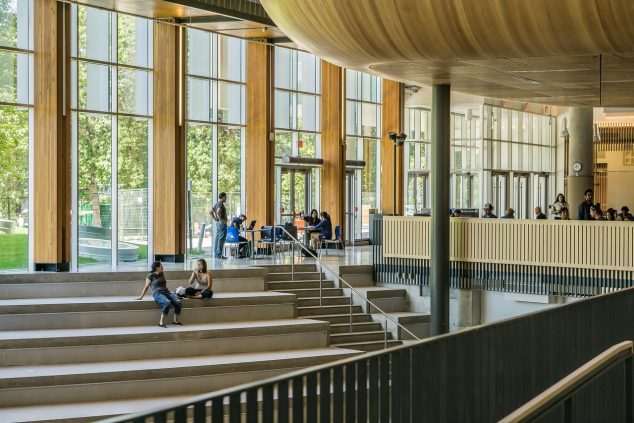You have already made the decision to study maths at university, but how do you decide which courses to apply for? This article won’t tell you where to choose, but hopefully it will get you to ask the right questions, so that you can make a good decision for yourself.
Will I be accepted?
This is the first question that most students ask themselves. Be realistic, but also remember that you have a long time until exam season – it is good to aim high and work towards getting the best grades you can. If you are applying for a course which requires an extra entrance exam such as STEP then there is now lots of extra support such as that provided by the AMSP.
Do I like the university location as a whole?
Before you start to think about the maths degree, have a think about the university location and environment. Could you see yourself being happy there and spending three or four years there? Some universities are based on campuses, whereas others are more integrated within a city. You might also have preferences about how far you are willing to travel or which part of the country you want to be in. Nothing beats making a visit in person, so once you have a shortlist you should pencil in some Open Days.
Reputation of maths department and university
The good news is that maths degrees have a good reputation with employers, regardless of institution. Reputation can be based on rumour and the personal opinion of the last person you spoke to. Therefore, it is good to check out some good hard evidence before you judge the so called reputation. You could look at:
- Student Satisfaction
- Employability Statistics
- Destinations for leavers
A lot of this information can be found on the Unistats website which includes information from the National Student Survey (NSS). It can also be found in prospectuses and on university course pages.
Lots of students are deciding between institutions which have very similar entry requirements. In reality most employers will be happy to take on students from a variety of different institutions, so you don’t need to worry too much in this regard.
Structure of degree
It is really important to consider what type of degree you want to do. If you are interested in studying maths alongside another subject then you should read our detailed article on Joint Degrees. This could determine which institution you go for, as the options for joint degrees vary a lot.
You may also want to spend a year abroad or to complete a sandwich degree where you spend a year in industry. Look for universities that have a good track record in offering this type of degree. If you are interested in a sandwich degree then you should find out about the support which will be given in securing a placement and about how many students take this option. You will want to be well supported when you are away from your university.
Many students study for an integrated Masters Degree (MMath). Find out how that works where you want to study and when you need to choose between the BSc and MMath.
Academic support
There are many maths undergraduates who have always found maths relatively easy at school or college. A maths degree might be the first time that they have actually found maths challenging. Many courses are taught in a lecture style format, which means that it isn’t always possible to understand everything during the lecture itself. This means that it is important to check out what academic support structures are available. Will there be small group tutorials? Or support classes for individual modules? Some universities offer drop-in centres for maths support. Find out how you will be supported academically.
Some maths departments are small, whereas others are extremely large, with a year group containing over 250 students. This can affect the student experience and should be considered carefully before you apply. There are some advantages to a large department such as increased module choice, whereas other students prefer a much smaller and close-knit environment. If you are planning to join a large maths department, it is even more important to check out how you will be supported once you are there.
Style of maths degree
Maths degrees do vary a lot between different institutions. While a lot of the basic content will be the same, they will also have big differences. Some maths degrees will have more of a focus on practical applications, whereas others will be more abstract. Some will have more of an emphasis on the use of computers and will help you to learn programming skills, whereas in other maths degrees this will not play such a big part. Some maths degrees will have a huge choice of optional modules, whereas with others it could be more limited. Get a feel for the style of the degree and whether it suits you.
Talk to the maths lecturers and maths students!
It is important to visit several universities and make a point of talking to the lecturers who will teach you. Some prospective students visit a university, hear the Vice Chancellor’s talk, see the accommodation and don’t focus on the department they will actually be studying in. You need to meet the staff in the relevant department and hear first-hand how maths students are taught and supported.
Costs and finance
Student finances can be a big concern, and there are certainly different costs associated with different universities. However, don’t let the headline figures put you off from choosing an institution which would otherwise be right for you.
Remember that student loans only need to be repaid once your earnings rise above a certain level. Student loans are not like normal bank loans which need to be repaid even if you fall on hard times. When you have graduated you won’t need to pay back your student loan if your income drops below the threshold.
Some universities also offer extra help in the form of scholarships and bursaries. This could be related to parental income, academic achievement, or whether you are the first one in your family to go to university. This type of support can vary a lot between institutions, therefore you should do some extra research if this applies to you.
You should also put together a detailed budget related to actual living costs. (These are often listed on university websites.) This will help you understand the reality of what you will need. Many students also find manageable part time work to help top up their income, while also gaining valuable work experience. You can also cut costs by choosing a cheaper halls of residence in your first year, instead of the deluxe options which some universities offer.
The main message is: try not to let finances be the deciding factor in your choice of university. If this is a big worry get some extra advice when you attend an open day.
You also need to remember that maths graduates are in high demand and can command high salaries. Five years after graduation maths graduates are earning on average over £35,000 per year, which is more than a veterinary science graduate at the same stage of life. This makes the costs associated with a maths degree a worthwhile investment for your future.
Specialist interests
Many students have a specialist skill or interest which is really important to them personally. Examples could include elite sports, playing jazz or acting. As well as considering your maths degree, you should also check that your university will cater for your interests, as it is important to enjoy your time outside of your course. Some universities offer bursaries for students who are competing in sports at a high level.
Don’t worry too much
Once you have considered all the important questions, you will probably be left choosing between a small number of different maths degrees. For most students they would be happy at any one of their shortlisted universities, so it is important not to worry about this final selection. If you have done your homework on the different courses and have attended some open days then you can feel confident that you have made a good choice. If you are really unsure then don’t hesitate to make a second visit to a university.










